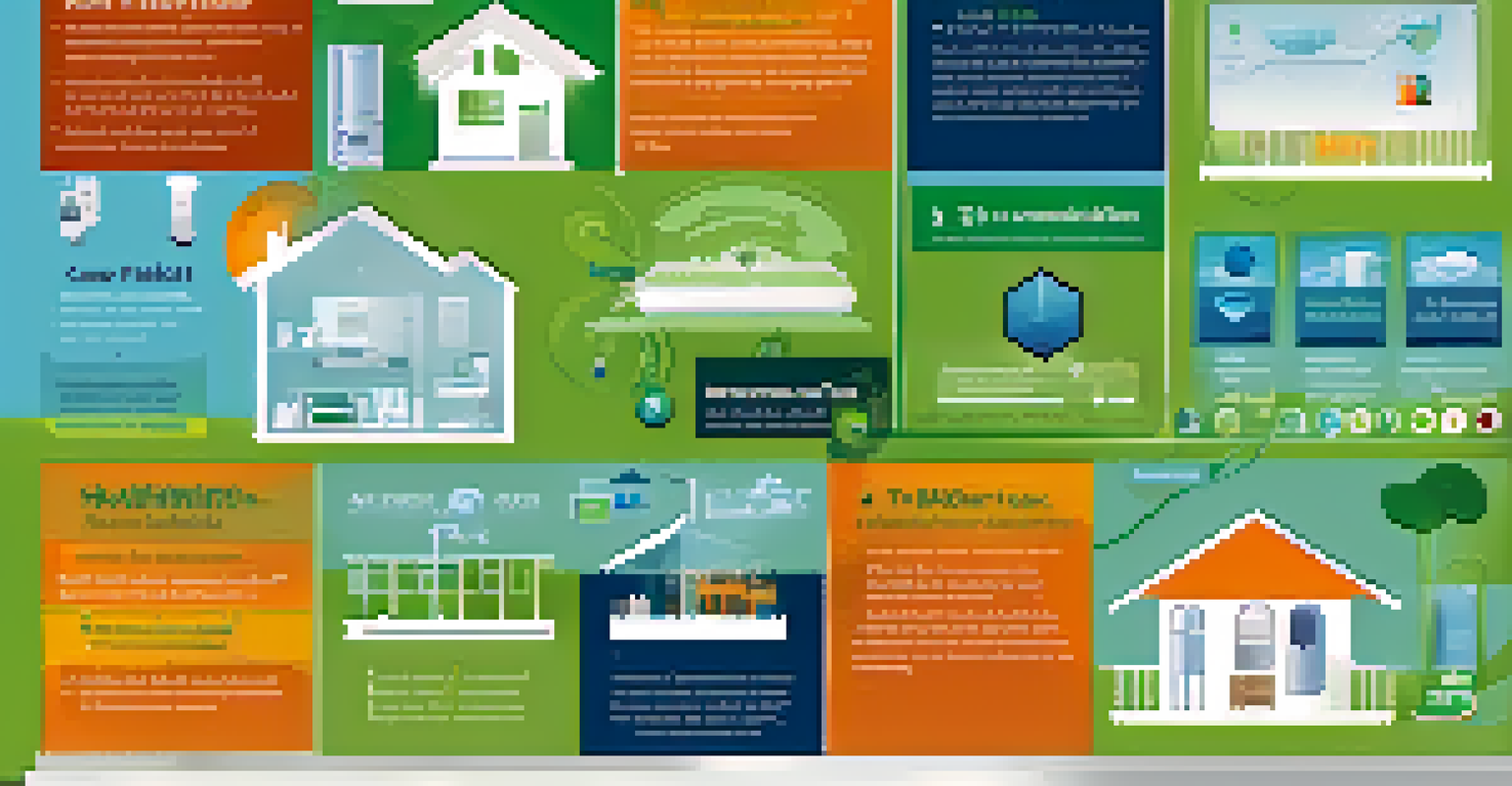The Benefits of Home Automation for Sustainability

Understanding Home Automation and Sustainability
Home automation refers to the use of technology to control various systems in your home, such as lighting, heating, and security. This technology allows homeowners to manage their environments more efficiently and conveniently. In the context of sustainability, home automation can play a crucial role in reducing energy consumption and minimizing waste.
The greatest threat to our planet is the belief that someone else will save it.
Sustainability, on the other hand, is about meeting our present needs without compromising the ability of future generations to meet theirs. It encompasses responsible resource management and environmental stewardship. By integrating home automation with sustainable practices, homeowners can make smarter choices that benefit both their wallets and the planet.
When we combine these two concepts, we find that home automation not only simplifies our daily lives but also fosters a more sustainable lifestyle. This article will explore the various benefits of home automation and how it contributes to a greener future.
Energy Efficiency: A Major Benefit of Home Automation
One of the most significant advantages of home automation is its potential for energy efficiency. Smart devices can monitor and control energy usage in real-time, allowing homeowners to make informed decisions about their consumption. For instance, smart thermostats can adjust heating and cooling settings based on occupancy, ensuring that energy isn’t wasted when no one is home.

Moreover, automated lighting systems can be programmed to turn off when a room is unoccupied or adjust based on natural light levels. This not only reduces electricity usage but also extends the lifespan of light bulbs. By leveraging technology, homeowners can significantly lower their energy bills while contributing to lower carbon emissions.
Home Automation Boosts Energy Savings
Smart devices help homeowners monitor and control energy usage, leading to lower bills and reduced carbon emissions.
In essence, energy efficiency is a win-win situation. Home automation empowers homeowners to take control of their energy use, leading to financial savings and a reduced ecological footprint.
Water Conservation Through Smart Home Technology
Water conservation is another crucial aspect of sustainability, and home automation can help significantly in this area. Smart irrigation systems can monitor weather conditions and soil moisture, ensuring that lawns and gardens receive the right amount of water. This prevents overwatering and reduces water waste, which is essential in regions facing drought.
Sustainability is not a destination, but a journey.
Additionally, smart home devices can detect leaks in plumbing systems and send alerts to homeowners. Early detection can prevent costly water damage and ensure that water is not wasted due to unnoticed leaks. By being proactive about water management, homeowners can contribute to a more sustainable future.
Ultimately, integrating water conservation measures through home automation leads to responsible resource management. It's a practical step toward protecting our most precious resource while also saving money on water bills.
Reducing Carbon Footprint with Smart Devices
Home automation plays a pivotal role in reducing our carbon footprint. By optimizing energy and water usage, smart devices contribute to lower greenhouse gas emissions. For instance, by using smart appliances that operate during off-peak hours, homeowners can take advantage of cleaner energy sources, which are often more abundant at night.
Moreover, smart home systems can provide insights into your consumption patterns, helping you identify areas for improvement. This awareness encourages more sustainable behavior, such as turning off devices when not in use or opting for energy-efficient appliances. Over time, these small changes can lead to significant reductions in carbon emissions.
Water Conservation Through Technology
Automated systems prevent water waste by managing irrigation and detecting leaks, promoting responsible resource management.
In adopting home automation, homeowners are not just investing in convenience; they are actively participating in the fight against climate change. Every step taken to reduce your carbon footprint contributes to a healthier planet for future generations.
Enhanced Home Security and Sustainability
Home automation also enhances security, which can indirectly support sustainability efforts. Smart security systems, such as cameras and motion sensors, help deter theft and vandalism. When homeowners feel secure, they are more likely to invest in sustainable home improvements, such as solar panels or energy-efficient windows.
Furthermore, smart security devices can be integrated with other home systems to enhance overall efficiency. For example, if a homeowner leaves the house, the security system can automatically adjust the thermostat and turn off unnecessary lights. This not only saves energy but also provides peace of mind.
In essence, a secure home fosters an environment where sustainable practices can thrive. Home automation encourages homeowners to make greener decisions, knowing their homes are protected.
Convenience Leading to Sustainable Choices
The convenience offered by home automation can make adopting sustainable practices easier. Smart devices simplify tasks like adjusting the thermostat or turning off lights, making it more likely that homeowners will engage in energy-saving behaviors. This ease of use can lead to more consistent and mindful resource management.
For example, with a simple voice command or mobile app, you can check your energy usage and adjust settings accordingly. This immediate feedback loop encourages users to be more conscious of their consumption and make changes that align with their sustainability goals.
Convenience Drives Sustainable Choices
The ease of using smart devices encourages homeowners to adopt eco-friendly practices, integrating sustainability into daily routines.
When sustainable practices become effortless, they are more likely to be integrated into daily routines. Home automation empowers individuals to make environmentally friendly choices seamlessly.
Long-Term Cost Savings from Sustainable Automation
Investing in home automation may seem costly upfront, but the long-term cost savings can be substantial. By improving energy and water efficiency, homeowners can significantly reduce their utility bills. In many cases, these savings can offset the initial investment in smart technologies over time.
Additionally, many utility companies offer incentives for homeowners who adopt energy-efficient systems, further easing the financial burden. These incentives can include rebates, tax credits, or lower rates for using energy during off-peak hours.

Ultimately, making your home smarter not only benefits the environment but also your wallet. Home automation is a forward-thinking investment that pays dividends in sustainability and cost savings.
The Future of Home Automation and Sustainability
As technology continues to advance, the potential for home automation to enhance sustainability will only grow. Innovations in artificial intelligence, machine learning, and IoT (Internet of Things) can lead to even smarter systems that learn and adapt to our habits. This means more efficient energy use and better resource management.
The integration of renewable energy sources, like solar panels, with smart home technology will further propel this movement. Homeowners will be able to monitor and adjust their energy consumption seamlessly based on real-time data from their solar systems.
In conclusion, the future of home automation holds great promise for sustainability. As more people embrace these technologies, we can collectively work towards a greener, more sustainable world.